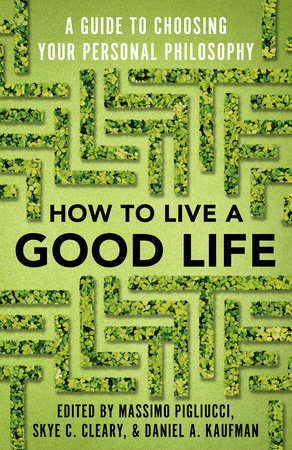How to Live a Good Life, Edited by Massimo Pigliucci, Skye C. Cleary and Daniel A. Kaufman
Edit picked this up as soon as it came out and I got first go at it. Billed as "A guide to choosing your personal philosophy" it is a collection of essays written by practitioners of a range of practical philosophies and religions. Each philosophy is presented in brief, but through a personal lens. The book is divided into sections on eastern philosophies (Buddhism, Confucianism, Daoism), classical western philosophies (Aristotelianism, Stoicism, Epicureanism), "Religious Traditions" (Hinduism, Judaism, Christianity, Progressive Islam, Ethical Culture), and modern philosophies (Existentialism, Pragmatism, Effective Altruism, Secular Humanism). So it's certainly not exhaustive -- what book could be? -- but its range is broad and diverse.
Given the format, I figured I could probably dive in anywhere, so I went for the modern section, which caught my curiosity. Here, more than the rest of the book, I found the personal stories more interesting than the philosophy. Existentialism and Pragmatism are certainly presented a very personal searches, but Effective Altruism -- as on offshoot of utilitarianism -- seems the application of a formula. I was deeply impressed by the commitment and goals of its practitioners, while the philosophy struck me as somewhat bonkers. Secular Humanism seems as much a political manifesto as anything else, albeit one I'm probably signed on to.
Going back to the start of the book, I read on the eastern philosophies. Comparisons are often made between the classical western and eastern philosophies, and overall they do seem to have covered much of the same ethical space. I certainly found connections between all of them and Stoicism. The Buddhists and the Stoics are on the same page when it comes to anger (as the author himself noted). The Daoist focus on the impermanence of the world and going with "the flow" is inline with Stoic ideas, and in Confucianism I found a role ethics comparable with that found in the teaching of Epictetus.
Despite my partisanship, I enjoyed the defences of Aristotelianism and Epicureanism. I read with a mixture of fascination and disquiet the chapter on Hinduism: Stoics choose to give adversity meaning, but karma makes suffering positively valuable. Judaism seemed surprisingly relatable; the author explains that as the Hebrew Bible is not a philosophical text, they have to look elsewhere, resulting in a diversity of opinion that is embraced rather than lamented: "two Jews, three opinions". I was also interested to see that the writer of that chapter is a woman who decided at the age of fifty to become a rabbi, so it's never too late to change career.
I struggled with the section on Christianity. While the author felt hamstrung by the diversity of Christian thinking, is that really so different from any of the others? I found it vague and difficult -- particularly strange given that it's the one I'm most familiar with after Stoicism. "Mental maps" were mentioned on several occasions. The chapter on Progressive Islam was enthusiastic, and indeed sounded "Progressive", but I didn't get much of an idea about what drove it except the desire to be modern (which I in no way condemn).
I found myself surprisingly sympathetic to Ethical Culture, after initially internally deriding it as "religion for atheists". In particular I was interested in the way the author dealt with the unusual feature of having the founder of her movement, Felix Adler, alive within living memory. Despite apparently being a man of unusual integrity and drive, he was -- in part -- a man of his time (typically sexist). But the Ethical Culture participants are apparently able to embrace what was good and leave behind what was bad without rancour. I can imagine that there are those for whom classical philosophy will be lacking in form and ritual and would be right at home with Ethical Culture.
I left Massimo's section on Stoicism to last, and even contemplated skipping it as I thought I had a very good idea of what it would contain. But re-reading philosophy is a classic Stoic discipline, and the discussion of Enchiridion 1:5 was exactly what I needed today.
Overall, this is an enjoyable volume, which you can dip into or read cover to cover. If you're interested in thinking about how to live your life -- and you should be -- then this is worth a read.
